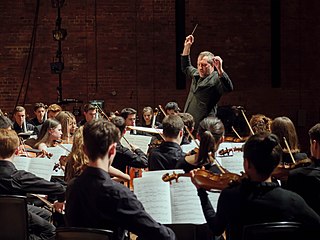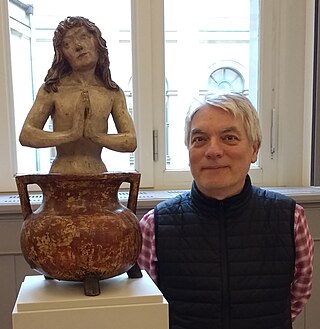Related Research Articles
Ellen Taaffe Zwilich is an American composer, the first female composer to win the Pulitzer Prize for Music. Her early works are marked by atonal exploration, but by the late 1980s, she had shifted to a postmodernist, neoromantic style. She has been called "one of America's most frequently played and genuinely popular living composers." She was a 1994 inductee into the Florida Artists Hall of Fame. Zwilich has served as the Francis Eppes Distinguished Professor at Florida State University.

Stuart Oliver Knussen was a British composer and conductor.

Magnus Gustaf Adolf Lindberg is a Finnish composer and pianist. He was the New York Philharmonic's composer-in-residence from 2009 to 2012 and has been the London Philharmonic Orchestra's composer-in-residence since the beginning of the 2014–15 season.

Thomas Joseph Edmund Adès is a British composer, pianist and conductor. Five compositions by Adès received votes in the 2017 Classic Voice poll of the greatest works of art music since 2000: The Tempest (2004), Violin Concerto (2005), Tevot (2007), In Seven Days (2008), and Polaris (2010).

Simon Holt is an English composer.

Madeleine Louise Mitchell MMus, ARCM, GRSM, FRSA is a British violinist who has performed as a soloist and chamber musician in over forty countries. She has a wide repertoire and is particularly known for commissioning and premiering new works and for promoting British music in concert and on disc.
Paul Watkins is a Welsh classical cellist and conductor. His brother is the composer Huw Watkins. Watkins studied cello with William Pleeth, Melissa Phelps and Johannes Goritzki. In 1988, he won the BBC Young Musician of the Year in the string section. From 1990 to 1997, he was principal cellist of the BBC Symphony Orchestra.
Richard Causton is an English composer and teacher.
David Sawer, is a British composer of opera and choral, orchestral and chamber music.
Huw Thomas Watkins is a British composer and pianist. Born in South Wales, he studied piano and composition at Chetham's School of Music in Manchester, where he received piano lessons from Peter Lawson. He then went on to read music at King's College, Cambridge, where he studied composition with Robin Holloway and Alexander Goehr, and completed an MMus in composition at the Royal College of Music, where he studied with Julian Anderson. Huw Watkins was awarded the Constant and Kit Lambert Junior Fellowship at the Royal College of Music, where he used to teach composition. He is currently Honorary Research Fellow at the Royal College of Music.

Thomas Larcher is an Austrian composer and pianist.

Graham Waterhouse is an English composer and cellist who specializes in chamber music. He has composed a cello concerto, Three Pieces for Solo Cello and Variations for Cello Solo for his own instrument, and string quartets and compositions that juxtapose a quartet with a solo instrument, including Piccolo Quintet, Bassoon Quintet and the piano quintet Rhapsodie Macabre. He has set poetry for speaking voice and cello, such as Der Handschuh, and has written song cycles. His compositions reflect the individual capacity and character of players and instruments, from the piccolo to the contrabassoon.
Helen Grime is a Scottish composer of contemporary classical music. Her work, Virga, was selected as one of the best ten new classical works of the 2000s by the Royal Scottish National Orchestra.
Charlotte Bray is a British composer. She was championed by the Royal Opera House Covent Garden, London Sinfonietta and Birmingham Contemporary Music Group, BBC Symphony Orchestra. Her music has been performed by many notable conductors such as: Sir Mark Elder, Oliver Knussen, Daniel Harding, and Jac van Steen.
Caught in Treetops is a concerto for solo violin and chamber ensemble by the British composer Charlotte Bray. The work was commissioned by the Birmingham Contemporary Music Group and Sound and Music. It was first performed on 14 November 2010 at the CBSO Centre, Birmingham by the violinist Alexandra Wood and the Birmingham Contemporary Music Group under conductor Oliver Knussen. The piece is dedicated to the Birmingham Contemporary Music Group.
The Flute Concerto is a composition for solo flute and orchestra by the American composer Elliott Carter. The work was commissioned by Elena Bashkirova for the Jerusalem International Chamber Music. Carter began the composition in September 2007 and completed it in March 2008 at the age of 99. The piece was first performed at the Jerusalem International YMCA on September 9, 2008 by the flutist Emmanuel Pahud and the Jerusalem International Chamber Music Ensemble under the conductor Daniel Barenboim.
The Double Concerto for Harpsichord and Piano with Two Chamber Orchestras is a composition by the American composer Elliott Carter. The work was commissioned by the Fromm Music Foundation and is dedicated to the philanthropist Paul Fromm. It was completed in August 1961 and was first performed at the Metropolitan Museum of Art's Grace Rainey Rogers Auditorium on September 6, 1961. The premiere was performed by the harpsichordist Ralph Kirkpatrick and the pianist Charles Rosen under the conductor Gustav Meier.

Incantations, subtitled Concerto da camera, is a composition for piano and ensemble by Graham Waterhouse, composed in 2015 and first performed in Birmingham.
Alain Damiens is a French classical clarinetist.
Freya Waley-Cohen is a British-American composer based in London.
References
- 1 2 3 Grime, Helen (2017). "Piano Concerto". G. Schirmer Inc. Retrieved 16 July 2023.
- ↑ Jeal, Erica (6 March 2017). "BCMG/Knussen review – Helen Grime makes sparks fly". The Guardian . Retrieved 16 July 2023.
- ↑ Nepil, Hannah (7 March 2017). "The opposite of easy listening: BCMG at Wigmore Hall". Financial Times . Retrieved 16 July 2023.